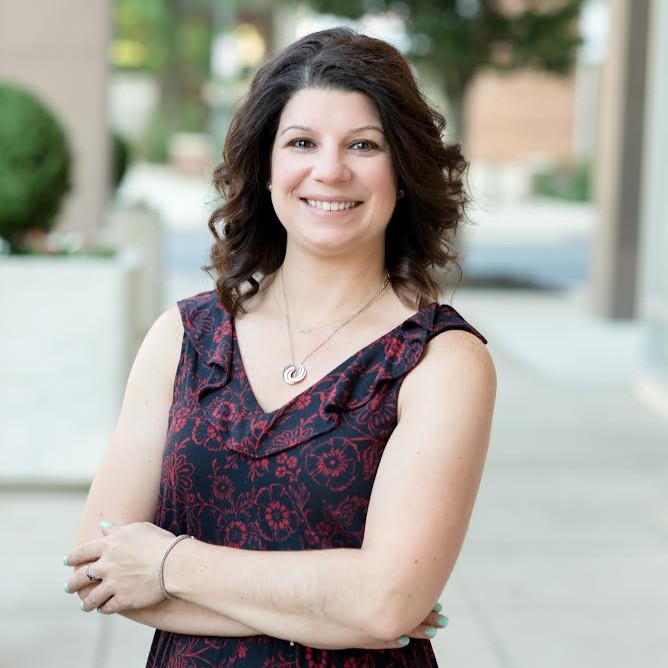
Amie Myrick, MS, LCPC
(she/her/hers)
Director of Evaluation and Quality Improvement
HOPE National Resource Center
Biography
Amie Myrick is a Maryland-licensed clinical professional counselor, Board-approved supervisor, and experienced leader with over 15 years of experience in project management, trauma-informed care, and research design. Her “why” is to create a compassionate world where all can feel seen.
Amie is the Director of Evaluation and Quality Improvement at the HOPE National Resource Center, where she develops and implements evaluation strategies to measure the impact of the HOPE framework at the system, provider, and family levels.
For many years, Amie has led initiatives across the country to build workforce and community capacity, improve trauma-informed approaches, and promote resilience. She has unique training in facilitation practices, implementation science, and change management and is skilled at fostering collaboration and translating research into action. In addition, Amie has co-authored over 30 peer-reviewed articles and several books on the impact of trauma-related interventions, cross-sectional approaches to adversity and resilience, and advocacy.
The HOPE framework aligns deeply with Amie’s passion for focusing on people’s strengths rather than their challenges. The profound connection between positive childhood experiences and well-being resonates deeply with her. This inspired her to become a HOPE Facilitator in 2022 and later, Maryland’s first HOPE Champion.
Outside of her professional life, Amie is a proud mom, a curious traveler who enjoys exploring new places and cultures, and an avid Orioles baseball fan.
Education and Training
MS
Johns Hopkins University, Baltimore, MD
BS
Towson University, Towson, MD
Local supports to break the cycle: A description of intersectional interventions to address adverse childhood experiences and drug overdose
Myrick AC, Adams CA, Cremer LJ, et al.
J Public Health Man. 2025 Mar/Apr. 31(2): 227-233. DOI: 10.1016/j.ejtd.2024.100460
Changes in therapists’ knowledge of symptom management and stabilization following program co-participation with dissociative patients
Myrick AC, Shielke HJ, Brand BL.
Eur J Trauma Dissociation. 2024 Dec. 8(4): 100460. DOI: 10.1016/j.ejtd.2024.100460
Assessing child and adolescent dissociative disorders and why it matters. In The concise guide to the assessment treatment of trauma-related dissociation
Myrick AC, Silberg J.
APA PsycBooks. 2024 Jan. 189-221. DOI: 10.1037/0000386-006
The Martinsburg Initiative: A collaboration between public safety, public health, and schools to address trauma and substance use
Wisdom AC, Villamil V, Govindu M,…, Myrick AC, et al.
J Health Manag. 2022 Nov/Dec. 28(Supp 6):S355-S358. DOI: 10.1097/phh.0000000000001591
Play psychotherapy with children traumatized by caregivers with alcohol abuse disorder: Integrative interventions
Green EJ, Myrick AC, Fazio-Griffith L.
Commonw Youth Dev. 2019 Sep 3. 16(1). DOI: 10.25159/2663-6549/3783
Empowering nondeployed spouses and children through filial therapy
Myrick AC, Green EJ, Barnes M, Nowicki R.
Int J Play Ther. 2018 Jul. 27(3):166-175. DOI: 10.1037/pla0000071
Fostering reconnection and resilience in complexly traumatized youth: Integrated of play into empirically supported treatment
Myrick AC, Green EJ, Fazio-Griffith L.
J Child Adolesc Couns. 2017 May 8. 3(2):120-128. DOI: 10.1080/23727810.2017.1320623
Engaging parents in adolescent therapy: Beyond the waiting room
Myrick AC.
Lanham, MD: Rowman & Littlefield. 2017 May 9. ISBN: 9781442250017
Treatment of dissociative disorders and reported changes in inpatient and outpatient cost estimates
Myrick, AC, Webermann AR, Langeland W, et al.
Eur J Psychotraumatol. 2017 Sep 19. 8(1):1375829. DOI: 10.1080/20008198.2017.1375829
Treatment of complex dissociative disorders: A comparison of interventions reported by community therapists versus those recommended by experts
Myrick AC, Chasson GS, Lanius RA, et al.
J Trauma Dissociation. 2015 Jan. 16(1):51-67. DOI: 10.1080/15299732.2014.949020
Engaging survivors of sexual abuse by religious and institutional authorities in prevention resource development through participatory research.
Violence Prevention Research Conference.
Presentation. Jul 2024. Portsmouth, NH.
Incorporating Assessment and Prevention of Adverse Childhood Experiences into Clinical Practice.
2023 AAP (American Academy of Pediatrics) National Conference & Exhibition.
Workshop presentation. October 2023. Washington, DC.
Addressing intersections of suicide, overdose, and ACEs at the local level.
Safe States Injury & Violence Prevention Annual Conference.
Presentation. Sep 2023. Denver, CO.
Putting ACEs through the PCEs: Adverse childhood experiences and positive childhood experiences in clinical practice.
Pediatric Academic Societies 2023 Conference.
Presentation. May 2023. Washington, DC.
Effective online safety: Exploring the harm reduction approach.
Maryland Nonprofits Annual Conference 2022.
Presentation. Oct 2022. Virtual.
Leading teams with a trauma- and assets-informed approach.
Maryland Nonprofits Annual Conference 2022.
Presentation. Oct 2022. Virtual.
Strengthening response to the intersection of suicide, overdose, and adverse childhood experiences.
Maryland Opioid Operational Command Center (OOCC) Best Practices Conference.
Presentation. Apr 2022. Virtual.
The impact of resistance and life stressors on treatment response for patients with dissociative disorders.
2021 International Society for the Study of Trauma and Dissociation Conference.
Presentation. Apr 2021. Virtual.
Revisiting the role of revictimization and stress in the course of treatment for dissociative disorders: Data from the TOP DD Network Study.
35th International Society for the Study of Trauma and Dissociation Conference.
Presentation. Mar 2018. Chicago, IL.
Quality of life in patients with dissociative disorders: The role of posttraumatic stress and dissociative symptoms.
34th International Society for the Study of Trauma and Dissociation Conference.
Presentation. Apr 2017. Washington, DC.






